How did I ‘collide’ with the English language? If it’d not been for Parmehutu, some of us’d never have come in contact with the language, even if we seemed to have been predestined to be Anglophone……


How did I ‘collide’ with the English language? If it’d not been for Parmehutu, some of us’d never have come in contact with the language, even if we seemed to have been predestined to be Anglophone……
First, Parmehutu. This was Kayibanda’s political party and the acronyms stood for Partie pour l’Emancipation Hutue (Party for the Emancipation of Hutus). In short, it was targeting a section of Rwandans along ethnic groups that had existed as one family before colonialism.
By sharpening their small differences, colonialists hoped to divide the groups and prolong their (colonialists’) rule.
Due to the short-sightedness of some of the indigenous leaders of the time, the colonial effort succeeded. What followed were pogroms that culminated in the 1994 genocide……
Even before running away from those pogroms, however, we enjoyed close ties with Anglophone Uganda.
Having been born in the north-western horn of Rwanda, we as families found ourselves drawn towards Uganda because of a conspiracy of reasons. Among the reasons was Mutorere Parish, in Bufumbira, Uganda.
It was nearer, bigger and better than our Rwandan parish of Kinoni, a reason why we preferred to attend mass there. Also, you could pass through the neighbouring shopping centre of Gisoro.
Mutorere Parish had many things going for it, especially for young cadres of the Catholic Church. Unlike our Kinoni, Mutorere had a church that had high glass windows which, if you looked carefully, showed visions of the Virgin Mary in resplendent colours of blue, green and red.
If you looked even more carefully, you could see her son, Jesus Christ himself, on the cross oozing water from his ribs, blood from his head, thorns crowning his head and all.
Later I came to know that it was the effect of the light on the coloured glass, but that has not stopped me from being mesmerized whenever I think back.
As for Gisoro, it was and still is an ordinary shopping centre not much different from, say, Rwamagana.
However, it was unique in that it was home to Indian traders, a race unknown to the northern part of Rwanda then – and maybe now! As toddlers in the 1950s, what consumed our attention was not so much the unusual colour of their skin but, rather, what they sold in their shops.
Many different things graced the shelves in their shops but of particular interest to us were things we pronounced in English then as kyekyi, switi and sodah. Those dukawalas, as the Indian traders were known, sold buns the size of bread and equally big sweets that had ‘contours’, delicacies unknown to our side of the border.
That meant that four of us could share one bun and that each one of us could take one ‘contour’ of the sweet and we always went home as happy cadres!
That, however, would have been after one small hitch! You see, the dukawalas sometimes did not care to use the local language, Igifumbira, much as most of them knew it.
It therefore required you to greet them and bargain in the other language that they used commonly, which was English. That is how we found ourselves mouthing things like: "Gudumoningyavariyu, sah! I yamu veliveli sankyu! Puliziswiti! Pulizikyekyi!” ("Good morning, how are you, sir! I am very well, thank you! Please, [give me a] cake! Please, [give me a] sweet!”) Of course, the greeting and the answers and requests were all unwittingly bundled together!
And with that you handed over the coin, which you held by its middle hole while shyly drawing circles on the shop floor with your big toe because you feared having made mistakes.
I do not recall whether they used to return our greetings or how they used to understand our request, but I know that they always did our bidding! Also, I have a feeling that our pronunciation enjoyed a none-too-light influence of their own version of English.
In November 1959 when we were tossed out of Rwanda and into exile in Bufumbira by Parmehutu, we young ones saw it as a blessing as we were crossing into the land of kyekyi and switi.
During the following few days, we could not let our parents rest until they had drafted us into school to learn English.
The fact that our teachers themselves had not been in very close proximity with the language for many hours was not known to us, and we chanted happily whatever they shouted to us: "Eh kawu izi ani animoru whichi gyivuzasi miruka!” ("A cow is an animal which gives us milk!”)
It was much later that I realized that English is indeed a lingua franca, spoken differently by different communities, and pronounced in a way that could sometimes make the queen of England cry in shame.
You have to accept it then, and live with the task of deciphering a meaning out of things like con-hegyisiti for ‘context’ in Rwanda/Bufumbira, anahpreyahboroh for ‘unplayable’ in Kigezi/Ankole, cholupe-choluchooon for ‘sulphate-solution’ in Dokoli-land/Luo-land, bibolu for ‘people’ in Luhya-land/Kalenjin-land, ikopreti for ‘incomplete’ in Kikuyu-land or mbimbrunko for ‘biblical’ in Meru/Ukambani!
And that’s the beauty of English: everyone has their own peculiar version!
ingina2@yahoo.co.uk


